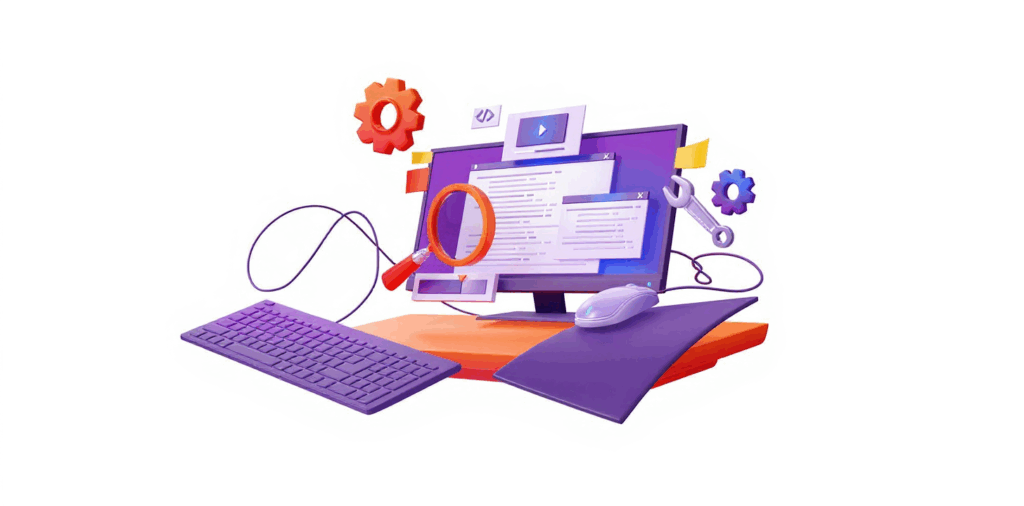Table of Contents
Running a small business is no small feat. You wear many hats: owner, marketer, customer service rep, maybe even the IT guy. And in the middle of it all, your website plays a crucial role: it’s your digital storefront, your first impression, and often your main sales channel. But none of that matters if your web hosting lets you down.
Imagine spending hours perfecting your website, only for customers to land on a slow-loading page or, worse, a site that’s offline. It’s not just frustrating; it’s a lost opportunity.
That’s why choosing the right web hosting isn’t a technical side note, it’s one of the smartest investments you can make for your business. The right host keeps your site fast, secure, and always available, giving you the confidence to grow without worrying about tech headaches.
5 reasons why web hosting is important for your small business :

1. Downtime kills revenue fast.
Businesses lose an average of 5 hours per month due to business downtime, with many suffering losses exceeding $2,500 and an average of $418 to resolve issues.
On the other hand, small businesses lose between $137 and $427 per minute of downtime, equivalent to $25,000 per hour.
2. Poor Performance Drains Traffic and Revenue
- 35% of businesses experienced slow site loads in the past year; poor performance results in traffic losses of around 7.5% on average
- Over 26% saw bounce rates surpassing 30%, and 10% had bounce rates above 50%, pushing visitors away before they engaged.
- Consequently, 12% of business owners reported losing revenue monthly due to performance issues, averaging $20,172 per year, about 15% of revenue
3. Customer Trust and Credibility Take a Hit
A survey found 37% of businesses lost customers following website downtime
Frequent crashes or slow response times erode brand confidence and can drive customers to competitors even if your site looks great.
4. SEO and Visibility Are on the Line
Google and search engines factor in site speed and availability. Frequent downtime or lag can lower your ranking and make your business harder to find
Missing uptime targets repeatedly can quietly blacklist your site in search, compounding traffic losses over time.
5. Security Breaches Are a Real Threat
- 43% of cyberattacks target small businesses, and 90% of data breaches involve web applications
- Poor hosting environments or missing backups lead to real data loss, 76% of businesses reported data loss following downtime
- 51% of small businesses report their site was down for 8–24 hours due to an attack, with many taking over 24 hours to recover
Understanding the impact of web hosting on your small business is just the first step, choosing the right host is where success begins. But how can you choose the right one for you?
Here are the key features to look for:

1- Uptime reliability (99.9%+)
Uptime refers to the percentage of time your site is online and accessible.
Your website is your front door to customers. But what if that door doesn’t open when they arrive?
Reliable uptime is what keeps it wide open, ensuring your business stays visible, professional, and trustworthy.
When you see a 99.9% uptime promise, that might seem impressive, but what does it actually mean?
It translates to roughly 43 minutes of downtime per month, or about 8.8 hours per year.
For small businesses, even those without massive traffic, each minute offline is lost revenue, lost trust, and lost growth.
Your website needs to be available whenever your customers are, day or night.
Even a small dip below 99.9% can mean hours of lost revenue and
missed opportunities each month.
A survey conducted by Liquid Web showed that businesses typically lose 5 hours per month due to outages, and 20% of businesses lose more than $2,500 per month, with an average repair cost of $418 per month.
Akamai also reported that 79% of online shoppers will not return after experiencing performance issues, driving away regular visitors.
2- Performance (speed & caching)
In today’s digital world, a slow website isn’t just inconvenient, it’s a barrier between you and your customers. Every second your site lags is a moment visitors slip away. That’s why top-performing web hosts prioritize both load speed and smart caching techniques.
The result?
A fast, seamless experience that keeps users engaged, boosts conversions, and enhances SEO.
So, Why Speed and Caching Should Be Non-Negotiable?
- User Experience and Bounce Rates:
– Sites that load in under 2 seconds can maintain a bounce rate as low as 9%, while sites taking 5 seconds soar to a 38% bounce rate.
– According to SiteBuilderReport, a 2-second delay doubles the bounce rate; a 3-second delay leads to a 32% rise in abandonment - Conversion and Revenue Impact
Every additional second of load time can reduce conversions by 7%.
While e-commerce revenue nearly doubles when load times are reduced from two seconds to one second ($1,525 vs. $840 per 1,000 visits).
- Real-world Case Studies
– Vodafone saw an 8% sales increase by optimizing Core Web Vitals.
– Yelp achieved a 15% conversion boost by improving First Contentful Paint.
– Other companies with just 100ms faster load times experienced significant gains in conversions and bounce reduction
So if you want to experience the same growth as this business, you have to choose the best web hosting website. Here you need to check Thamara’s web hosting.
3- Customer Support: 24/7 Availability You Can Count On
Creative ideas, beautiful design, and stellar performance all matter, but what happens when technology hiccups?
That’s where responsive, expert customer support steps in. For small business owners, having access to knowledgeable support at any hour isn’t just comforting, it’s a strategic advantage.
Whether it’s a late-night error, domain issue, or payment gateway hiccup, prompt human assistance ensures your business stays on track.
A single poor support experience can lead 61% of customers to change their service, and alarmingly, 76% of them leave after a second poor interaction.
With good WordPress hosting, our priority at Thamara is your 24/7 support.
4- Scalability & Flexibility: Hosting That Grows With Your Business
Imagine hosting that feels as rigid as a tight shoe, you outgrow it fast. Scalability and flexibility mean your hosting infrastructure can stretch or shrink according to your needs. For small businesses, this ensures that your website handles spikes in traffic, adds features seamlessly, and avoids costly tech hurdles as you expand.
A resilient infrastructure maintains consistent performance as your website grows. Without it, increased customer or traffic volume could slow down or even shut down operations.
According to Liquid Web research, fast and scalable hosting ensures your website can keep pace with growing traffic, customers, and operations, a cornerstone of sustainable digital growth.
Scalability isn’t just technical; it’s also strategic. We’ve achieved this at Thamra, enabling small businesses to use one-time payment web hosting.
Scalable systems enable businesses to enter new markets, support more users, and launch additional services without the need for major overhauls.
5- Easy-to-use control panel
A clean, intuitive dashboard matters more than you might think, especially when you’re juggling business tasks and don’t want to struggle with technical complexity. A user-friendly control panel like cPanel or Plesk transforms complex server management into simple clicks, saving time, reducing frustration, and empowering you to run your website smoothly without needing deep tech skills.
cPanel is recognized as the market-standard GUI for hosting management, offering easy access to essentials like file handling, domain setup, email creation, and database control without command-line knowledge
Plesk, meanwhile, wins praise for its modern, clean interface and built-in wizards ideal for users managing both Linux and Windows servers or looking to handle Docker, Git, and WordPress Toolkit from one dashboard
According to industry comparisons, Plesk’s interface often feels more intuitive for beginners compared to cPanel’s text-heavy layout, decreasing configuration mistakes and onboarding time
If you want to go deep and know all the differences between them, you should chick this blog
Plesk vs. cPanel: Everything You Need to Know Before You Choose
6- Freebies That Matter: Domain, SSL, Email & Backups Included
Smart hosting is more than just uptime and speed it includes core tools that protect and promote your business. Domain registration, SSL certificates, email accounts, and regular backups transform your hosting plan from a basic utility into a full-featured foundation. These perks save you time, money, and technical hassle, especially in the early stages of growth.
1. Domain Name: Build Your Brand from Day One. A domain typically costs $10–$15/year
2. SSL Certificate: Security as Standard
SSL is essential, not optional. Certificates range from $200/year for premium validation
3. Email Accounts: Professionalism That Doesn’t Break the Bank
Custom domain email addresses (e.g., you@yourbusiness.com) elevate credibility.
4. Automated Backups: A Safety Net You’ll Want
Backups are non-negotiable, yet many cheap host plans charge extra for them. Including weekly or daily backups is a lifesaver when crashes or mistakes happen.
But with Thamara, you do not have to think this at all because we provide you with the best web hosting services, all of the above for free.
You’ve poured your time, effort, and passion into building your business. Don’t let weak hosting hold it back. The right web hosting isn’t just a technical detail. It’s your silent business partner, working 24/7 to keep your site fast, secure, and ready for whatever comes next.
Whether you’re just launching or leveling up, make sure your hosting is built to support your goals, not limit them.
Here, Thamara web hosting will play the right role for you.
FAQS
1. Why is uptime so important for my website?
Uptime ensures your website is accessible to customers at all times. Even a few minutes of downtime can lead to lost sales and a negative impression. Always choose a host that offers at least 99.9% uptime guarantees with strong reliability.
2. Is free web hosting a good option for my business?
Free hosting may seem attractive, but it often comes with serious limitations like slow speeds, lack of support, limited storage, forced ads, and no custom domain. For a professional business, investing in a reliable paid host is essential for trust and growth.
3. What type of web hosting is best for small businesses?
For most small businesses, shared hosting or managed WordPress hosting offers the best balance of affordability, performance, and ease of use. If you’re expecting higher traffic or growth soon, VPS or cloud hosting may be worth considering for scalability



